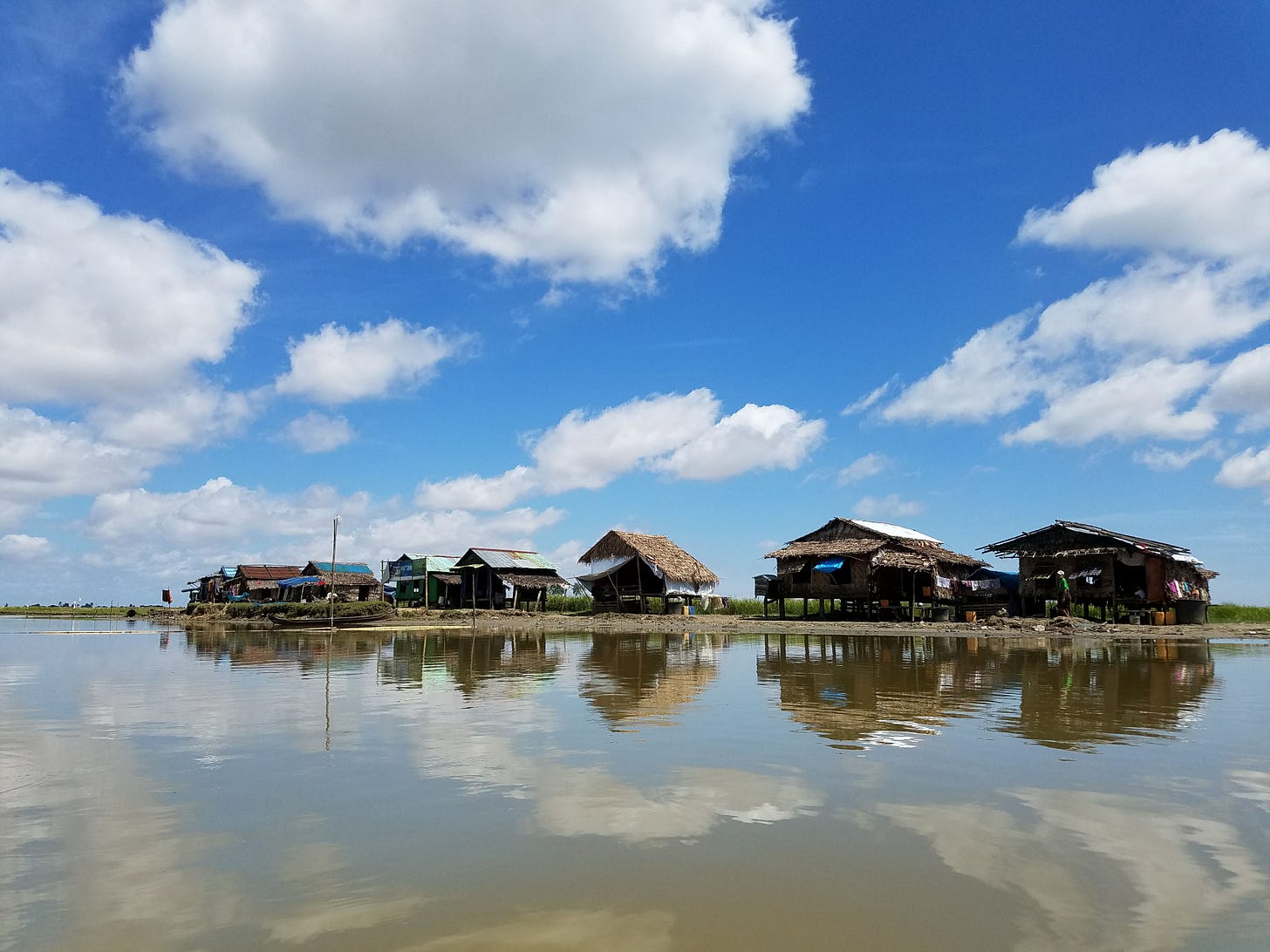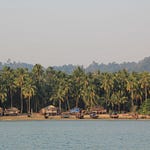KEY POINTS
Read "The Divide: A Brief Guide to Global Inequality and its Solutions" (published 2017) by
, especially if you're from the Global NorthThere are powerful linkages between this book's lessons on poverty and international aid, and how international conservation operates
The Global North's harmful legacy on the Global South is substantially more extensive, purposeful, and entrenched in international structures than I had previously realized - with important implications for conservation
The most striking things I learned from this read relate to: the role of the "development" narrative casting the Global North as saviors; the hypocrisy and counterproductive structure of international aid; who we see as "corrupt"; land grabbing, including for REDD; investor protections (this was WILD); power inequity in international bodies; shifting milestones obscuring lack of progress; changing the narrative of who we should be learning from
I was grumpy in college, too (even grumpier, actually), and I hated on the high-end designer fashion shows for charity that wealthy students at my wealthy university put on - and this is relevant, I promise
INTRO
I'll start by acknowledging that I am far from a specialist in regional and international conservation agreements and structures. I am familiar enough with them to grant that useful outcomes and important shifts have been enabled through them; I've been involved in projects where I've seen how these almost abstract international processes do connect to action on the ground (with many caveats). But, to be frank, I find this dimension of conservation pretty boring (yes, I said it) and frustrating, as that on-the-ground connection is often convoluted, obscure, and inefficient, and generally defined by: overly ambitious, out-of-touch goals; unrealistic plans and timelines for achieving them; within global structures that are demonstrably inequitable; and without sufficient integration of inputs from Global South voices (was that sentence long enough?). At worst, such high-level conservation decisions can actually result in perverse outcomes that harm the most vulnerable.
International conservation, generally, has been characterized by the disproportionate power of Global North technocrats (technical experts, so... quite possibly many of you who are reading this) in decision-making in the Global South, with inadequate acknowledgement of the past (colonialism) and present (overconsumption) contribution of the Global North to global environmental problems.
In short (too late): my general sense of how international conservation functions has long given me the "ick." And after reading Jason Hickel's book, The Divide: A Brief Guide to Global Inequality and its Solutions, that "ick" has grown to outrage. Why? Because the culpability of the Global North in all that is wrong with the world is so much greater, and more systematic, than I'd previously imagined - and mainstream conservation accepts and operates within this unethical, inequitable system without substantively challenging it, and while often perpetuating harmful assumptions that have been fueled by it.
THE BOOK
So yes, this "Deep Dive" is all about my previously-alluded-to "terrible beach read," so-called because it stoked bouts of profound outrage and nerdy light-bulb moments that were incongruent with my relaxing on vacation, which is when I chose to read it. The Divide is not directly about conservation, though Hickel does discuss climate change toward the end. But it is about the global system and structures that disadvantage the Global South, which are particularly relevant because (1) they drive negative environmental impacts, and (2) mainstream conservation operates in concert with them. If you work on conservation issues in the Global South and you are from the Global North, I strongly suggest you read this book. Hickel's critiques of international aid are perhaps the most obvious parallel to international conservation, but there's also plenty more for us to learn and take to heart from this book.
"The Divide," published in 2017, is a sort of primer on how the current state of global inequality has unfolded through recent centuries, via the intertwined legacies of: colonialism, the industrial revolution, the disingenuous narrative of "development," military interventions to quell threats to Global North commercial interests, the loan-to-debt pipeline and resulting structural adjustment programs, unequal trade agreements, tax evasion, and international decision-making entities that severely disadvantage the Global South while entrenching the power of the wealthiest nations (who have a vested interest in keeping labor and resource costs low in the Global South). It resoundingly demonstrates how the aid that the Global North "generously" contributes to help the "hapless" Global South mend its problems is meager compared to the money and resources that the Global North regularly drains from the Global South (based on data from 2012, $2 trillion in aid versus $5 trillion in outflows, showing that "poor countries are net creditors to rich countries").
And this book presents how many of those problems that Global North charity aims to solve were caused or at least exacerbated by the Global North. Basically, the Global North has created a system that entrenches the status of the wealthy and powerful at the expense of the vulnerable. This system is the engine of capitalism, which drives the pursuit of endless growth, at the expense of human and environmental well-being.
These topics are certainly discussed by many experts in conservation, but I've not seen them take center stage as they should. After all, this appears to be *the heart* of the problem, right? And as to those experts who discuss these topics in a substantive way, they are primarily powerful advocates from the Global South, who are thankfully being heeded more and more, but are still not given an adequate voice in international conservation platforms. I haven't seen enough attention and meaningful, action-oriented discourse on this from Global North folks (and no, a peer-reviewed paper that uses the word "just" and "equitable" a lot is not my idea of meaningful nor action-oriented).
There is SO MUCH about this book that I would love to dive into... I started marking passages that resounded with me, but was marking most of the book, so I stopped. I highly recommend that you read it, especially if you are from the Global North. For now, I'll try to communicate how this book taught me that the hypocrisy of Global North voices dictating conservation mandates is even far more profound than I'd previously realized. But first...
A DETOUR?! BEAR WITH ME
How do you all feel about charity galas or charity fashion shows put on by luxury brands? You know, wealthy people gathering together to party and then donate money, by way of purchasing something, to a worthy cause? All as part of "raising awareness" of causes that, often, come from (or at least are exacerbated by) inequitable accumulation of wealth?
When I was at Princeton University, I was a financial aid kid, so definitely not from the demographic that was accustomed to such events. Well, there was a student-run charity fashion show, with pieces contributed by high-end brands. Many of the students who I knew to be involved came from monied families. And I was struck by the strangeness of the whole process. "Wait... so all these people, who have a lot of money, are soliciting donations from luxury designers, who also have a lot of money, to throw an event - that costs money - in order to raise money for things they want to give money to...? And congratulating themselves on their generosity?"
I couldn't fully articulate at the time why that seemed a little... icky... to me. And when I tried to, I was scolded by other students (I have a long history of saying things that people apparently don't like). Wealthy people throwing a luxurious party, with nary a beneficiary in sight (that would ruin the mood!), to entertain themselves in order to help the needy and make themselves feel charitable felt inefficient, but also, out of touch and borderline offensive.
(This is an analogy for Global North-driven international aid and conservation, in case that wasn't clear)
BACK TO THE BOOK
I won't attempt a thorough book review or summary. I wouldn't be able to do it justice. I just want to share some highlights of what I learned that felt particularly relevant to the field of conservation:
How we view poverty and "underdevelopment" - often seen primarily as regrettable barriers to effective conservation, for which generous aid and expertise from the Global North is required to combat, yet as Hickel says (p. 23): "If we bring history back into the analysis, the story of global inequality begins to take on a far more complex and even sinister hue. The whole idea that rich countries are the saviours of the poor countries begins to seem more than a bit naive" and "The development industry likes to refer to poor countries by the passive adjective 'underdeveloped'... perhaps it would be more accurate to make the term a transitive verb, 'under-developed': to have had one's development intentionally obstructed, undone or reverse by an external power."
The rise of international aid, marked by Truman's administration, was based on a "narrative [that] was useful because it overrode any suggestion that the Western powers were in any way responsible for causing suffering in the South." In conservation, there's far from enough acknowledgment of the outsized negative impact of the Global North, not only on the environment, but also on the challenges that Global South countries face in managing and conserving their own resources. And yet, the Global North retains greater power in influencing conservation-related decision-making, and many Global North conservationists do see themselves as saviors.Foreign aid generally operates as part of the system that is causing the problems, and as such, can even be complicit in exacerbating these problems. As on page 29: "Indeed, some of this damage is caused by the very groups that run the aid agenda: the World Bank, for example, which profits from global South debt; the Gates Foundation, which profits from an intellectual-property regime that locks life-saving medicines and essential technologies behind outlandish patent paywalls; and Bono, who profits from the tax haven system that siphons revenues out of global South countries."
I've seen people fall over themselves at conferences to cozy up to representatives of wealthy donors or foundations (I understand the motivation/perceived need to do so, and perhaps if I were more naturally charismatic, I'd try the same). But I go back to my "fashion show for charity!!!" hater days in those moments. Hickel addresses this, via a quote from Oscar Wilde: "'It is immoral to use private property to alleviate the horrible evils that result from the institution of private property.' Here he draws our attention to yet another problem with the charity paradigm. To the extent that charity is enabled by the accumulation of surplus wealth it can never be a meaningful solution - for the very processes by which wealth is accumulated are those that produce poverty in the first place... In almost every case we can find that the accumulation that sustains charity comes from processes that cause the very problems they purport to solve." (pg. 256-257).
Feel free to replace the word "poverty" with "planetary destruction."Oh, corruption! That all-too-present barrier to effective conservation! But what Global North conservationists often don't think about is: the Global North actively disrupted emerging developmentalist governments that were emerging in the post-colonial Global South in the 1950s-1970s. These governments were building prosperity in their countries, protecting their economies for greater autonomy and a more fair world order, which threatened Global North commercial interests. Usher in the coups. My goodness, I'd known about the Banana Wars in Latin America, but the list of Global North-mediated coups that Hickel describes in this book is dizzying. I was embarrassed I hadn't known of most of them.
So, many of the corrupt governments we decry might well be a result of actions of our own home countries. Another quote: "In the Western imagination, Africa is stereotyped as a continent plagued by corrupt dictators, with the supposition... that Africans are perhaps too 'primitive' to appreciate the virtues of Western-style democracy. But the truth is that ever since the end of colonialism, Africans have been actively prevented from establishing democracies" (p. 124).
And anyway, Hickel points out that the impacts of bribery and theft by government officials has a tiny impact compared to that of commercial tax evasion; as calculated by Global Financial Integrity, tax evasion can be up to 65% of "total illicit outflows" e.g. illegal movement of money out of a country. This is facilitated by the presence of tax havens, built and maintained by Britain, the US, and some European countries. And the World Trade Organization (where countries with more economic power have more influence) has made it almost impossible for customs officials to investigate possible misinvoicing (one means of illegally sneaking money out of a country). When one considers this, "it seems a bit strange that rich countries appear in corruption-free yellow on the Transparency International map" (p. 231).Land grabbing and the importance of tenure rights: I hadn't known about the history of dispossession of land rights. Apparently, until the 15th century, peasants in Europe had secure access to land, or a "basic right of habitation" through tradition and laws. "It was unthinkable that anyone should not have secure access to the basic resources they needed for survival," (p. 77). Well, the wealthy folks started privatizing common lands in England in the 15th century to raise sheep for the lucrative wool trade, in an "enclosure movement" that resulted in mass displacement. This practice expanded, converting secure tenure rights into a market for leases, rewarding the most "productive" peasants and thus driving intensification of farming techniques, with the benefits primarily going to the landlords, in this "formal birth of capitalism" (p. 78).
This expanded to Ireland (leading to the Great Hunger), America (leading to massacres and mass displacement of Native Americans), and India (where 30 million people died over two famines, 20 years apart). The mandate? Land "improvement," which meant maximizing profits from the land, as the main criterion for land ownership, according to John Locke. If the people already living on the land were not using it in a maximally "productive" manner, they had no right to it. This rhetoric still pops up, e.g., I heard it by certain proponents of an updated land use policy in Myanmar, where land held by ethnic groups with no formal titles was seen as "vacant, fallow, and virgin lands," and thus by default owned by the government.
Tenure rights are widely accepted as a key component of effective conservation. But I hadn't realized how severely they had been constrained throughout history.
Land grabbing is a major issue today. More recently, the food-price crisis (starting in 2007) triggered massive land grabs by investors for agricultural production and countries concerned about food security. Hickel offers the definition of land grab as "a transfer of at least 500 acres to be converted from smallholder production, collective use or ecosystem services to commercial activity" (p. 234). The economic benefit of these land grabs often come at the price of "environmental damage and human harm: vulnerable people end up displaced from their land and stripped of their access to food and independent livelihoods," (p. 234). Most of the land-grabbers are rich investors, targeting land in the Global South. 66% of the land grabbed between 2000 and 2010 was in Africa, where communities often hold land without formal titles; rather, control is based on customary norms or oral tradition. But formally, the state owns much of the land (another colonial legacy), so that politicians can sell or lease the land without any say from the actual inhabitants.
And here's where it gets really juicy for us conservationists: "but perhaps the most disturbing trend is that land grabbing is now also being conducted in the name of the most progressive cause of this century: climate change mitigation" (p. 238). Yes, good ol' REDD. I'll do another post on REDD and similar interventions, but for now, some quotes (from p. 239):
"REDD pilot projects have led to the forced eviction of indigenous communities from forests..."
"REDD is also incentivising a new wave of land grabs: corporations and states are rushing to buy up forests in developing countries in order to cash in on the payouts, a practice now known as 'carbon colonialism'"
"Some of the very companies that are driving deforestation through land grabs are now grabbing yet more land under the guise of offsetting..."...Did you know that foreign corporations can SUE countries that limit their "potential earnings" through enforcement of social or environmental regulations? Did you know this?! Because I did not. The International Centre for Settlement of Investment Disputes (ICSID), part of the World Bank, originally established to offer some security to foreign investors against their assets being nationalized by the countries in which they operated. But this was expanded to the point where investors whose "expected future profits" were reduced by environmental and social regulations could sue for exorbitant damages. One example: Mexico had to pay $15.6 million in damages to Metaclad, a US corporation that was polluting the local water supply via a hazardous waste landfill, because the municipal government closed down said landfill. This "investor protection" basically gives corporations the right to ignore local regulations. And! States don't have the right to sue foreign investors!
Along the lines of viewing social and environmental regulations as barriers to evade: the World Bank actually publishes a "Doing Business" report that ranks countries on the ease of doing business in them, e.g. fewer regulations equals a higher score. There's actually an *app* for investors to redirect investments based on changes to regulations, away from "barriers" such as better wages for workers, taxes on the wealthy, and stronger regulations around purchasing (grabbing...) land. What?!Power inequity in international bodies: Now, this I knew for the UN (hello, Security Council!), but hadn't realized so much for the World Bank and International Monetary Fund (IMF). First, World Bank and IMF are granted "immunity status" in the same way that the Red Cross and UN are, so they can't be sued by countries for the damages that their policies cause (which, as you'll see in this book, are... major). And the voting power in these bodies is proportional to a nation's "share of financial ownership," i.e., richer countries get more say. The leaders have, at least as of 2017, always been appointed by the US and European countries. Not only do the UN and World Bank have direct links to environmental decision-making, but it also just seems wrong that, on top of the blatant inequity in these bodies, international conservation bodies and platforms are so disproportionately influenced by Global North interests.
Shifting milestones in measuring progress: Much more to say on this with respect to global conservation goals, but: many of the big headlines you might have seen over the past, oh, 20 years about progress toward goals for poverty and hunger reduction don't tell the whole story. In brief: the progress that's been touted obscures the reality that the targets for poverty and hunger reduction have repeatedly been watered down. The goal for halving the number of people below the poverty line (set in 1996) was updated to halving the *proportion* of people living below the poverty line compared to 2000, by the year 2015 (in 2000, through the Millennium Declaration). Well, that 2000 baseline was shifted back to 1990 in the Millennium Development Goals, making the "progress" seem more monumental, based largely in gains in China (where the World Bank and IMF had not imposed free-market capitalism) during the 1990s (but not so much elsewhere). And the poverty line has been changed - effectively lowered, when valued as actual purchasing power. This tomfoolery continues with the Sustainable Development Goals (SDGs).
Hickel argues that this "Great Poverty Disappearing Act" is a narrative that deflects from deeper examination into the global economy. If poverty and hunger can be effectively reduced in this system, then it much work!
I've always been wary of large-scale, high-level conservation goals, a la SDGs and 30x30, especially since I know how there's not nearly enough monitoring and evaluation to really know how we're doing on those goals. I'm not suggesting that conservation-related progress has been subjected to the same watering down "sleight of hand" as Hickel presented in the case of poverty, because... I wouldn't know! Again, that high-level realm is not my area of expertise. But it's something to stay vigilant for, in any form of monitoring and evaluation.Degrowth, and shifting the narrative on who helps who: toward the end of the book, Hickel presents analyses of the comparative consumption of the Global North and South, which I won't go into here, because... well, I already knew that. But this quote resonated with me: "...we should regard countries like Costa Rica not as underdeveloped, but rather as appropriately developed. We should look at societies where people live long and happy lives at low levels of income and consumption not as backwaters that need to be developed according to Western models, but as exemplars of efficient living - and begin to call on rich countries to cut their excess consumption" (p. 293). And he provides some examples - glimmers of hope, perhaps - of other ways of valuing our world and resources: the Gross National Happiness index in Bhutan; the notion of sumak kawsay (Quechua for "living in harmony and balance") as promoted by indigenous activists in Latin America, and incorporated into the constitutions of Ecuador and Bolivia as recognition of the rights of ecosystems to flourish; and ecological swaraj in India, where communities exercise direct democracy regarding their environments rather than following top-down plans from central governments.
SO, WHAT DO WE DO?
Again, I strongly encourage you - especially if you are from the Global North - to read this book and reflect for yourself how it shifts your worldview and your perspective of what "the right thing to do" might be.
Candidly, it seems we all need to start being committed, fearless advocates for a more equitable world order, to the extent that we are willing to give up our unearned Global North privileges. I... don't know how to do that, yet. I know there are powerful people and voices who are engaging in that work. Probably like you, I don't see a ready path for me to channel my outrage from this book to meaningful action in terms of overturning capitalism, other than reducing my own consumption of resources.
I know, that's pretty feeble.
But in the context of the global conservation community, here are more concrete steps:
LEARN MORE about how very thoroughly the Global North has mucked everything up, and continues to muck it up, and yet has manipulated global entities and platforms to privilege Global North interests. Feel uncomfortable. It should feel uncomfortable.
Keep this in mind whenever you operate in international arenas. Check your own biases and assumptions with this deeper perspective on global inequity
Be MORE PROACTIVE in advocating for true inclusion of Global South voices in conservation. Don't just stop at lip service. Don't just use pretty language on your LinkedIn or X or Bluesky posts. Be willing to sacrifice your comfort to make things more fair.
Be more critical of the international structures in which global conservation functions. Maybe don't fawn so much over superwealthy foundations? That might be a stretch. Question the system in which we're operating. I realize that individuals and small organizations, particularly, might not feel like we have much power in overturning these large-scale hypocrisies. But maybe let's redirect some of our fawning and adoration to the people actually doing good work on the ground. One of the things that really broke my heart in this book was learning about the careers and lives of brilliant minds leading the Global South that were cut short by Global North-supported military interventions in the 1950s-1970s - let's remember to amplify and support the brave (usually, braver than us!) voices from the Global South today.
For Global North conservationists, the problems we're working to solve are our countries' fault, and the much of the privilege we enjoy on the international stage is a result of inequity that our countries have systematically engineered. And to this point, I'll leave you with two final quotes from Hickel:
"The aid paradigm allows rich countries and individuals to pretend to fix with one hand what they destroy with the other, dispensing small bandages at the same time as they inflict deep injuries, and claiming the moral high ground for doing so." (p. 31)
and:
"Fairness is better than charity." p. 257
Do you have any thoughts for tangible action that Global North folks can take to make the conservation realm more equitable? I'd love to hear them, especially if you're from the Global South and have the bandwidth to share.














Share this post